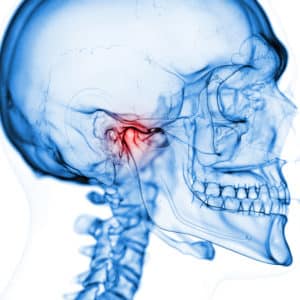Signs and Treatments for TMJ Disorder


Your temporomandibular joint (TMJ) is the hinge that connects your jaw to your skull. You can feel your TMJ if you place your fingers in front of your ears while opening and closing your mouth. If you have jaw joint pain, you might have a TMJ disorder, also called TMD. November is National TMJ Awareness Month, so if you’re having problems with your jaw or facial muscles, learn more about TMJ disorder below.
Temporomandibular Joint Disorder
Temporomandibular joint disorder is referred to as “TMJ” or “TMD”. Both are the same disorder that has to do with pain and other symptoms in the joints of the face. Your muscles, tendons and ligaments are all types of connective tissues that pull on your bones and allow them to move. However, that’s only thanks to your joints, which are the hinges that connect bones to one another and allow bones to move and pivot separately.
The temporomandibular joint is located in your head by the temporal bone and the mandible (hence the name “temporomandibular). This is the joint that connects this bone to your mandible (jaw). This joint is located on each side of the face. Most people don’t have pain in these areas of the face. However, if you have TMJ disorder, you may have pain and much more.
 Signs and Causes of TMJ Disorder
Signs and Causes of TMJ Disorder
Do you have pain in your jaw or with your teeth? Has it continued for weeks, months or even years? Do you experience chronic headaches or migraines seemingly without a cause? It would be wise to have a dental consultation to see if TMJ disorder is the culprit of these symptoms.
Millions of people have TMJ disorder. Patients commonly report having symptoms such as:
- Tenderness or pain in the jaw
- Pain in the area of one or both of the temporomandibular joints
- Pain around the ear but not exactly in the ear
- Difficulty chewing or pain while chewing
- A jaw that clicks or pops
- A locked jaw joint, which makes it difficult to open or close the mouth
- Chronic headaches or migraines, sometimes daily
If you have one or more of these symptoms, consult a dentist and/or a physician. A physician, however, will likely refer you to a dental office for treatment.
At-Home Treatments for TMJ Disorder
If you are unsure of the cause of your mouth or jaw pain, see if these at-home remedies can help you:
- Over-the-counter medication. For patients and non-patients experiencing mild to moderate jaw pain, over-the-counter medication can help soothe painful symptoms. If you use an anti-inflammatory medication (such as ibuprofen), it can also help soothe inflammation that has happened. Consult your dentist or physician for dosage.
- Heat and cold therapy. Warm compresses and ice packs can help calm down inflammation in the face and jaw, while also helping the area heal. Heat helps speed up blood circulation to an area in pain, while cold therapy helps to quell swelling and pain.
- Diet comprised of soft foods. You don’t want to be chomping down on hard foods when your mouth hurts, so stick to pastas, breads, yogurts, and other soft foods. Just always make sure to brush your teeth at least twice a day to avoid dental decay from food, as prescribed by the American Dental Association.

Professional Treatments for TMJ Disorder
The many signs and symptoms of TMD often lead the patient to a physician prior to seeking dental consultation. Confronted with these symptoms, the medical profession often treats these conditions with anti-inflammatory drugs, pain medication or tranquilizers. Often, those treatments wear off quickly without actually treating the cause of your jaw pain.
Dental professionals agree that TMJ disorder should be treated in the most conservative manner possible, with surgery being a last resort. Here are some of the most common methods to treat TMJ disorder:
- Prescription drugs. Until the cause is known, you may be prescribed drugs to help with the pain and inflammation if it is severe. However, drugs can often mask symptoms of a condition, do not treat the underlying cause and may have severe side effects. If you’ve been prescribed medicine from a doctor, make sure you make a dental consultation to know if there is a more conservative, effective way to treat your symptoms.
- Night guard. With growing technological advances, dentists are able to custom-made night guards and other mouth devices to alleviate pain placed on the temporomandibular joints. The cause of your issue can also be traced to a poor occlusion (bite), tooth grinding or other issues instead of actual TMJ. We will extensively evaluate your dental health and provide you with a guard to help the actual issue, especially when it is TMJ.
- Dental work. If the issue does trace back to occlusion, malocclusion, bruxism or other dental issues, we can potentially do cosmetic dental procedures to realign the teeth and bite. These are simpler, yet effective means of correcting dental issues that cause you pain.
- Surgery. Your bite can be a factor in many types of pain and functional problems because of the inter-relationships of the overall musculoskeletal system. Through new technology, we can evaluate your bite and determine if it is a major contributing factor of your condition. In the case where surgery is needed to correct bite and alignment, it is used. However, other methods are generally effective before surgery.
 Help for Your Symptoms
Help for Your Symptoms
Do you have symptoms of TMJ disorder? If so, make sure to schedule an appointment by calling Dr. Ania’s office at 303-443-0998. We can thoroughly examine your dental and facial joint health to determine the cause of your pain. We have devices to help stop TMJ disorder that are comfortable for your mouth. If TMJ is not the cause, we can look into treatments for sleep apnea, teeth grinding, tooth decay, or refer you for treatments such as dental botox. Don’t wait to be pain-free. Become that way by calling Dr. Ania’s office today!


